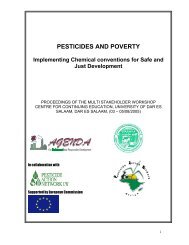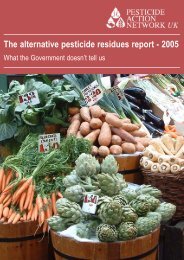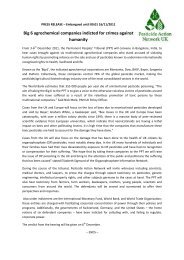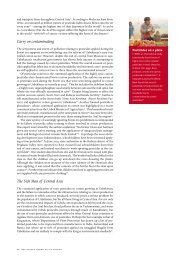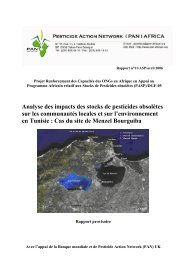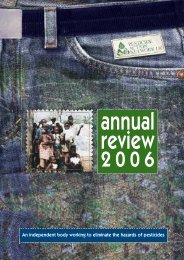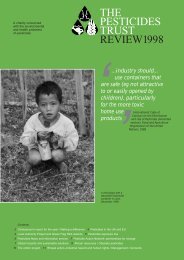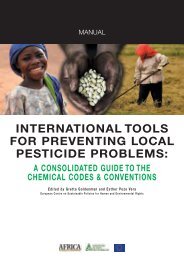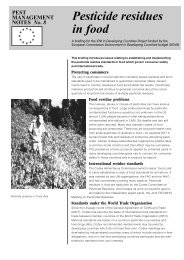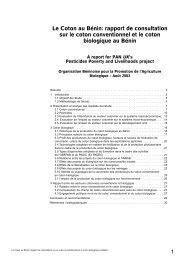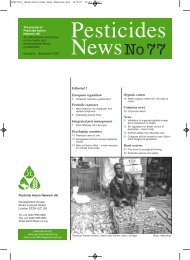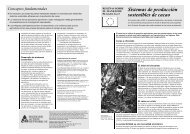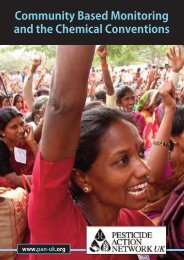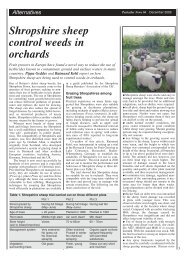Your Daily Poison - Pesticide Action Network UK
Your Daily Poison - Pesticide Action Network UK
Your Daily Poison - Pesticide Action Network UK
You also want an ePaper? Increase the reach of your titles
YUMPU automatically turns print PDFs into web optimized ePapers that Google loves.
14<br />
4 Discussion<br />
Since the last report there have been a<br />
number of important developments at both a<br />
national and international level. We review<br />
below the most significant for <strong>UK</strong> pesticide<br />
regulation, in terms of human health, in 2005.<br />
The evidence of exposure we have presented<br />
in this report should be considered in this<br />
wider context.<br />
The new report by the Royal Commission on<br />
Environmental Pollution, ‘Crop spraying and<br />
the health of residents and bystanders’, has<br />
created a potential for change in pesticides<br />
policy. It is the most authoritative <strong>UK</strong> report on<br />
the health risks of pesticide exposure for at<br />
least fifteen years, and PAN <strong>UK</strong> welcomes its<br />
thorough analysis. However the recently<br />
published government response has been<br />
disappointing 35 . The new All Party<br />
Parliamentary Group on <strong>Pesticide</strong>s and<br />
Organophosphates was formed in 2005<br />
(Appendix 7).<br />
A finding in the RCEP report is that illnesses<br />
reported by people exposed to pesticides do<br />
not match the symptoms that might be<br />
anticipated from toxicological tests on<br />
laboratory animals. This supports the<br />
information collected routinely by PAN <strong>UK</strong><br />
when people report their exposures and<br />
symptoms. The latest discoveries in toxicology,<br />
especially in relation to the insidious effects of<br />
endocrine (hormone) disrupting chemicals,<br />
indicate that there must be changes to<br />
regulatory toxicology. The true costs of ‘endless<br />
tests’ must be disclosed and the issue openly<br />
debated.<br />
The public should be informed by government<br />
about the current coverage of tests and its<br />
costs, and gaps where there is no knowledge.<br />
There should be public participation in the<br />
approvals of pesticides and in decision-making<br />
about testing, and its costs. The process<br />
should be open to scrutiny not only by<br />
government regulators, the scientific<br />
community and the agrochemical industry, but<br />
also by civil society.<br />
The need for regulatory reform<br />
The RCEP has confirmed concerns expressed<br />
for many years by PAN <strong>UK</strong>. It identified that<br />
‘the PSD combines both delivery of the<br />
pesticide approval process and policy advice to<br />
Ministers on pesticides’, and that ‘there is a<br />
danger of a conflict of interest, which may be<br />
greater where funding is derived from outside<br />
government 36 .’ ‘An executive agency of the<br />
government, the PSD is funded by government<br />
for its policy work, however the full costs of<br />
evaluating applications for pesticides approval<br />
are recovered from the industry through fees<br />
and levies. In the year 2003/04 the PSD<br />
received £4.363 million from the levy for<br />
regulatory work which includes monitoring and<br />
compliance and £2.791 million in industry fees<br />
for evaluating applications … [In the same year<br />
the PSD received] £5.379 million .. from Defra<br />
for policy-related activities.’ 37 PAN <strong>UK</strong><br />
welcomes the long-overdue recognition that<br />
these arrangements have profound<br />
implications for the governance of pesticides.<br />
We support the RCEP recommendation that<br />
government bodies should not hold<br />
responsibility for policy and for its execution on<br />
the same issue …. [and that] these issues<br />
should be separated between a government<br />
department and an arm’s length executive<br />
agency or non-departmental public body 38 .’<br />
The need for biomonitoring and health<br />
outcome surveillance<br />
The RCEP says ‘We were surprised to find that<br />
no efforts have been made to establish a<br />
database of baseline information for<br />
agricultural pesticides that are commonly used<br />
in the <strong>UK</strong>. The principle behind comparing an<br />
individual’s level with the population norm … is<br />
an entirely standard method of proceeding in<br />
many areas of clinical diagnosis. Baseline<br />
information is being collated in other countries,<br />
notably in North America and Germany, and<br />
could be used as a framework for information<br />
that could be collected in the <strong>UK</strong>… data on<br />
levels of exposure in the population would<br />
allow comparison with biomarker levels in an<br />
individual subject and provide an<br />
understanding of whether the level is unusual<br />
and in a range that might lead to an adverse<br />
effect. This information could be compared to<br />
symptoms of ill health and analysed for<br />
trends. 39 ’<br />
PAN <strong>UK</strong> has advocated a biomonitoring<br />
programme along the lines of the US National<br />
Health and Nutrition Examination Survey<br />
(NHANES) 40 to regulators for many years. We<br />
followed up the RCEP recommendation by<br />
advocating at a recent PAN Europe annual<br />
<strong>Your</strong> daily poison



